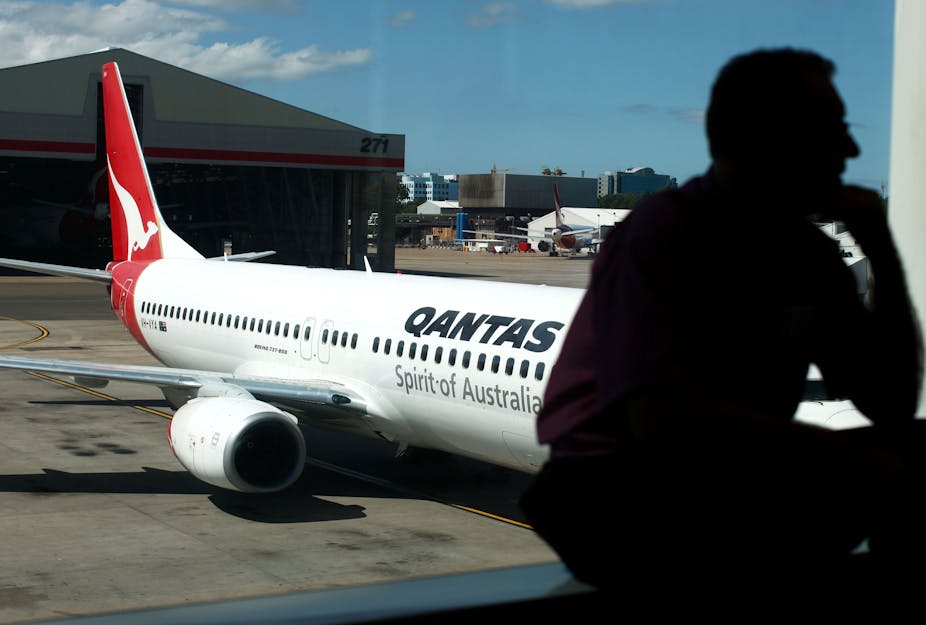Following on from Qantas CEO Alan Joyce’s controversial decision to lock out staff and ground the entire fleet, there has been a flurry of writing – in The Conversation and across the world – on the rights and wrongs of this action.
The debate has raised issues of current industrial relations law in Australia, political intervention and non-action, consumer response and demand, and brand loyalty and reputation damage.
The focus at this time is on the short-to-medium term future outcomes of these issues and the question of where now for Qantas?
Andrew Hughes writing on The Conversation suggests that while many of us will not currently wish to return to flying Qantas, most of us will do so, “flying Qantas out of necessity and not want”.
The choice Hughes offers that leads most of us to return to where we don’t want to be is a swap to Virgin Australia within what he terms a “duopoly”.
He does, however, mention “Qantas-lite” in the form of Jetstar, but does not reach out to Tiger, or to any of the newer regional players such as Strategic.
Of course, for many travellers within Australia, even these are not options, with Qantas currently holding a monopoly to Alice Springs and many other destinations. On the other hand, for international travellers, there are many other options.
International flyers voting with their credit cards
As has been pointed out, Australian international flyers have voted with their credit cards long before now, building the long haul market of Emirates, Etihad and other rivals who did not feature in the Australian market a decade or so ago.
If we look beyond the next few months and years, and at current trends elsewhere in the world, the outlook for Qantas may be one in which the necessity factor is reduced by players who don’t yet figure in the conversation.
Over the last few decades, European travel patterns have changed dramatically. Air travel has grown exponentially, but the old national carrier equivalents of Qantas have not been the major beneficiaries.
Low-cost airlines dominate
The market growth in air travel has been dominated by new players such as Ryanair, Easyjet, Air Berlin and the likes. In addition, the overall travel options have broadened to include Eurostar and other high-speed rail links.

Of course, such high-speed rail travel has been the norm in Japan for decades and has recently debuted in China, albeit with unfortunate early results.
Low-cost air travel has often been perceived as being for low-budget tourists. Ryanair has been widely reported for moves to downgrade the flying experience. These have included charging for hold luggage, using check-in desks and most recently allegedly for using on-board toilets.
Shorthaul business travel being transferred
However, there has been fairly extensive transfer of short-haul business travel to such airlines. Easyjet has a considerable business clientele, despite impressions presented in the “reality” tv program, Airline.
If we look a decade into the future of Australian domestic travel, it is perfectly feasible to imagine very different patterns from what currently exist.
The fast rail link from Melbourne through Canberra to Sydney and Brisbane may have been discussed for years, falling into farce as every council agrees to its passage subject to having a local station.
But if aviation fuel continues to rise in price, airport security becomes ever stricter and travel outside the CBDs of expanding cities becomes gridlock, investment in fast rail appears ever-more appealing.
This investment will need to be political, social and technological as well as financial. Such ideas may now seem unreal, but they cannot be discounted as implausible.

Even if we discount fast rail development in the next decade and remain committed to air travel, Qantas’ position must be considered in relation to some critical uncertainties. First, the airline currently awaits very late delivery of its much needed fleet upgrade, with the Boeing Dreamliner years behind schedule and the 767 fleet showing its age.
While Qantas waits for new technologies to arrive, other airlines may already be in a position to look for opportunities to exploit.
Internationals ready to jump in
During the recent disruption, it was reported that other airlines were ready to jump in to fill the domestic market, including Emirates. With the Sydney-Melbourne route being one of the busiest in the world, why would these competitors not look to the current opportunity to jump in?
Yes, they may lack the Qantas business model infrastructure of club lounges and devoted terminals, but such factors are not necessary to tie customers to the brand. With continuing global economic turmoil and businesses questioning their cost basis, why would these added extras be seen as a binding tie?
It is now many years since IT gurus pronounced the death of business air travel as video-conferencing would take over – along with the paperless office! While these visions have so far proved to be by-and-large science fiction, they also cannot be written off as implausible.
Overall, the current uncertainties of this world and this country – economic, environmental, social and political – point to a future for domestic and international air travel that is by no means certain and predictable.
If Alan Joyce and Qantas – and even the unions – come out of the current turmoil with a sense of closure and certainty, the only certainty they can really settle on is further turmoil ahead.

